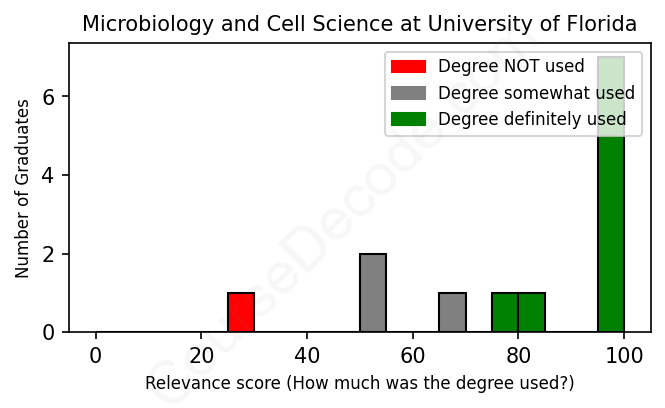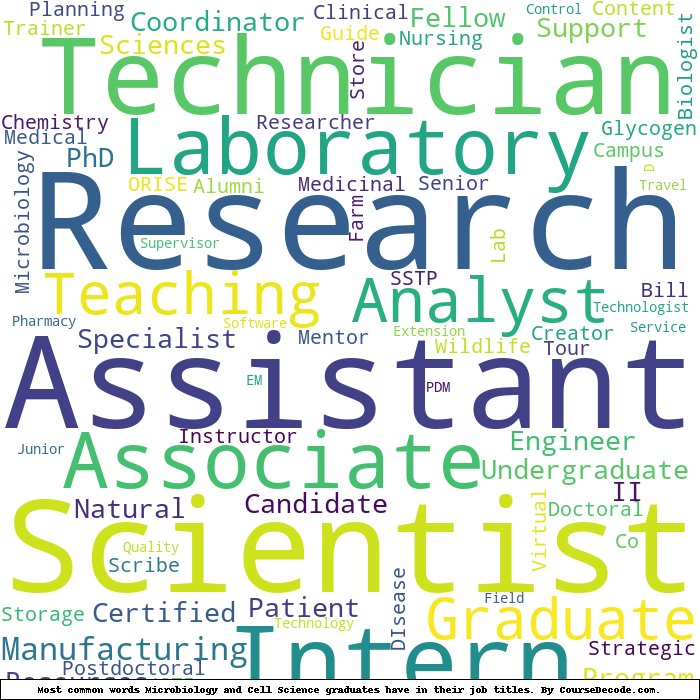
First, some facts. Of the Microbiology and Cell Science graduates from University of Florida we've analyzed , here's how many have used (or NOT used) their degree in their career:

These are estimates based on AI analysis of 13 LinkedIn profiles (see below).
The verdict? Significantly above average. Overall, with an average relevance score of 81%, Microbiology and Cell Science graduates from University of Florida have a much higher likelihood (+14%) of finding work in this field compared to the average graduate across all fields:
And for comparison, here's the chart for all profiles we've looked at across all degrees.
Also, after graduating, 61% of these graduates have pursued further education other than another Bachelor's degree (such as a Masters degree or other), compared to the average across all profiles of 35%. This suggests you may need more than just a Bachelors degree to be competitive as a Microbiology and Cell Science graduate.
See the details:
|
Relevance score: 84% We think this person has gone into a career highly relevant to their degree. We think this person has gone into a career highly relevant to their degree.
DEGREE INFOGraduated in 2016 from University of Florida with a Bachelor of Science - BS in Microbiology and Cell Science. Also pursued further education since (see below). JOB HISTORY SINCE GRADUATIONExtension Intern UF IFAS Sea Grant Extension 2016 - 2016 Coordinator  SYNNEX 2016 - 2017 Manufacturing Associate  Hitachi Chemical Advanced Therapeutics Solutions, LLC Apr 2017 - May 2018 Quality Control/EM Associate  Hitachi Chemical Advanced Therapeutics Solutions, LLC May 2018 - Aug 2018 Scientist I, Manufacturing Sciences & Technology  Brammer Bio Sep 2018 - May 2019 Scientist I  Thermo Fisher Scientific May 2019 - Sep 2019 Scientist II, Manufacturing Sciences  Thermo Fisher Scientific Sep 2019 - Sep 2020 Associate Scientist  Ology Bioservices, Inc. Sep 2020 - Apr 2021 Associate Scientist  Resilience Apr 2021 - Mar 2023 Scientist I  Resilience Mar 2023 - Dec 2023 PDM Engineer  DPS Group Global Jan 2024 - Present FURTHER DEGREES DONE SINCE GRADUATINGMaster of Science - MSUniversity of Florida 2022 - 2024 ABOUTNo information provided. |
The top 10 most common jobs done by the graduates we've analyzed (ranked most common to least) are:
Looking at the career paths of graduates from the University of Florida who studied Microbiology and Cell Science, it’s clear that a variety of roles are out there, ranging from research positions to roles in healthcare. Many graduates have landed jobs as Research Assistants, Scientists, and in positions related to laboratory work, which are all pretty relevant to their degree. For example, roles like ORISE Fellow at the FDA and various Scientist positions at biotech firms directly apply their microbiological knowledge and skills in practical settings. It's great because these jobs utilize what they learned in school and contribute to the scientific community.
However, not every graduate has stuck to the science-related jobs. Some have ventured into roles that are more administrative or even customer service-oriented, such as Certified Training roles or positions as Campus Tour Guides. While there may be some connection to science in these roles, they don't leverage the specific knowledge from their Microbiology and Cell Science degree. Overall, while a significant number of graduates have successfully found relevant positions, there remains a mix with some stepping outside the direct realm of microbiology, leading to a somewhat diverse career landscape.
Here is a visual representation of the most common words in job titles for Microbiology and Cell Science graduates (this is across all Microbiology and Cell Science graduates we've analyzed, not just those who went to University of Florida):

When looking at the career trajectories of University of Florida graduates with a degree in Microbiology and Cell Science, a mixed picture emerges. For many, the first jobs after graduation often fall into research-related roles or technical positions. For instance, the class of 2011 showcased early career moves into research assistant roles, both at university labs and medical institutes, with some pushing into fellowships at prestigious organizations like the FDA. Fast forward five to ten years, and several of these individuals have climbed the ranks to positions as scientists or senior scientists in biotech and pharmaceutical companies, demonstrating a solid connection between their education and career growth.
However, not all graduates follow this smooth path. Some recent alumni, like those from 2013 and 2020, have taken on jobs that seem less directly tied to their field, such as positions in customer service or unrelated technical roles. Yet, over time, many of these individuals pivot back toward relevant fields, transitioning into roles such as laboratory technologists or natural resource specialists. Overall, while significant numbers of grads are successfully pursuing careers directly related to their studies, there are certainly those who find themselves in more varied or unrelated jobs initially. The journey seems to blend both challenges and rewarding opportunities, with many eventually steering back toward careers in microbiology or cell science-related fields.
Honestly, a Bachelor’s degree in Microbiology and Cell Science can be pretty challenging, especially at a big school like the University of Florida. You’ll dive deep into complex topics like genetics, biochemistry, and cell biology, and that requires a solid grasp of math and science concepts. The coursework often involves lots of lab work and critical thinking, which can be tough but also pretty cool if you like hands-on experiences. While some students might find it manageable if they really enjoy science and stay organized, others might struggle a bit with the workload and the intensity of the material. Overall, it's a solid mix of rigor and interest, so it isn’t for the faint of heart, but if you’re passionate about it, you'll probably find it rewarding!
Most commonly, in the LinkedIn profiles we've looked at, it takes people 4 years to finish a Bachelor degree in Microbiology and Cell Science.
Based on the job paths of these Microbiology and Cell Science grads from UF, it really seems like they’ve navigated some decent earning potential, especially the ones who pursued research and scientific roles. The grad from 2011 moved up to a Senior Scientist position, which usually pays pretty well in biotech, while the 2016 grad is working as a Scientist II, often a solid six-figure job. On the other hand, some early roles, like the Certified Trainer at Panera Bread or the various technician positions, don’t usually come with high salaries, but those were likely stepping stones to better-paying jobs. Overall, while not everyone started off making bank, it looks like those who kept pushing into research and specialized science roles seem to be cashing in reasonably well now!
Here is a visual representation of the most common words seen in the "about" section of LinkedIn profiles who have a Bachelor degree in Microbiology and Cell Science (this is across all Microbiology and Cell Science graduates we've analyzed, not just those who went to University of Florida). This may or may not be useful:

Here are all colleges offering a Bachelor degree in Microbiology and Cell Science (ordered by the average relevance score of their Microbiology and Cell Science graduates, best to worst) where we have analyzed at least 10 of their graduates:
| College | Score | Count |
|---|---|---|
 University of Florida University of Florida
|
81 | 13 |